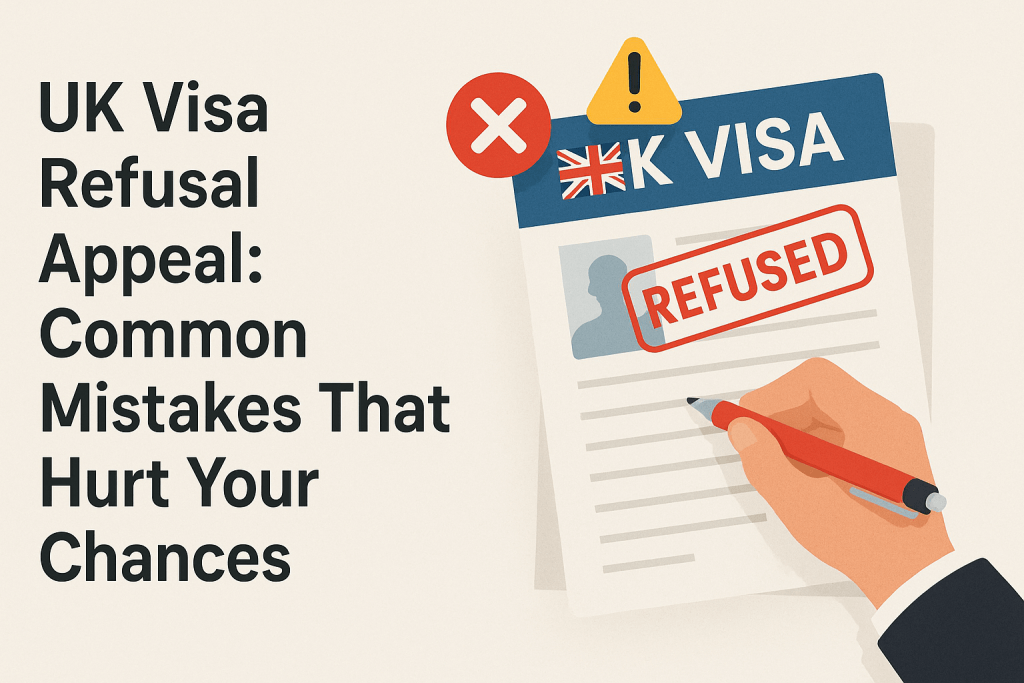No one really prepares for a visa refusal—until it happens. One day, you’re planning your move, booking tickets, maybe even dreaming about that new job or school in the UK. And then the email hits: application refused. It’s not just frustrating—it feels like the rug’s been pulled out from under you.
But here’s the thing. A UK visa refusal isn’t necessarily the end of the road. In many cases, it’s the beginning of a process people wish they’d understood earlier: the appeal. So, let’s break it down—what the UK visa refusal appeal process actually looks like, what most people get wrong, and how to handle it smartly.

Why Are So Many UK Visas Refused?
Before we jump into appeals, it helps to know why the Home Office says no in the first place. In a nutshell, most refusals fall into a few familiar categories:
- Missing documents or inconsistent information
- Lack of financial evidence or unclear proof of income
- Concerns about the applicant’s intent (like overstaying)
- Mistakes made by the applicant—or, yes, sometimes by the Home Office
And honestly? Sometimes it’s just miscommunication. One missing bank statement or a poorly worded cover letter can trigger a rejection.
First Things First: Can You Even Appeal?
Not every refusal comes with a right to appeal. In the UK, appeal rights are typically granted if the application touches on human rights (like family reunification), asylum, or EU settlement. If you applied under a visitor visa, student visa, or work visa, your refusal might come with only the option to request an administrative review, not a full-blown appeal.
So, read the refusal letter carefully. It’ll usually state whether you’re allowed to appeal, request a review, or reapply from scratch. This bit is crucial—don’t waste time going down the wrong path.
The Appeal Timeline: What to Expect?
Let’s say you can appeal. Great. Here’s what the road ahead might look like:
- You’ve got 14 to 28 days (depending on where you are) to lodge your appeal.
- The appeal is filed with the First-tier Tribunal (Immigration and Asylum Chamber).
- You’ll submit supporting documents, statements, and any legal arguments.
- Then comes the waiting game—hearings can take months, especially post-COVID.
- You may or may not be required to attend a hearing, depending on the case.
One thing most people don’t realize? You can actually strengthen your appeal after submission. If new documents come to light or your circumstances change, you can usually update the tribunal before your hearing date.
Common Appeal Mistakes That Cost People Time (and Sanity)
Here’s what we see over and over again:
- Relying solely on Google or forums: Helpful? Sure. Reliable legal strategy? Not quite.
- Submitting emotional statements without hard evidence: The tribunal needs facts, not just feelings.
- Missing deadlines: It’s not flexible—if you miss the appeal window, you’re out.
- Reapplying instead of appealing (when an appeal is the stronger route): Sometimes people panic and send in a fresh application. That can backfire if the root issue hasn’t been resolved.
Should You Hire a Legal Professional?
This isn’t a pitch—it’s a real question.
Some appeals are straightforward. Others involve complicated human rights claims, financial documents across multiple countries, or family reunification with dependents. If your case falls into the second category, professional help isn’t just helpful—it can be the difference between winning and losing.
If cost is a concern, look for immigration advisers regulated by the OISC (Office of the Immigration Services Commissioner) who offer tiered or fixed-fee services. You don’t always need a barrister in court. But you do need someone who knows what the Home Office looks for.
What If You Lose the Appeal?
Sometimes, despite your best efforts, the appeal is denied. If that happens, don’t lose hope. You can:
- Apply for permission to appeal to the Upper Tribunal, if there was an error in law
- Submit a new application, with improved evidence
- Wait and reapply later, especially if your circumstances are likely to change
Every path has pros and cons. The trick is not to act out of frustration. Get advice, take a breath, and build your next move carefully.
Final Thoughts: It’s Not Just Paperwork, It’s Your Life
A visa refusal can feel like a personal judgment, but often it’s a paperwork issue—or a misunderstanding. Appealing that refusal isn’t just a process. It’s you standing up and saying, “This deserves a second look.”
Whether you’re trying to join a family, start school, or build a new chapter in the UK, don’t let the system wear you down. Learn the rules, get good guidance, and give your appeal the attention it deserves. Because sometimes, the second try is the one that works.

